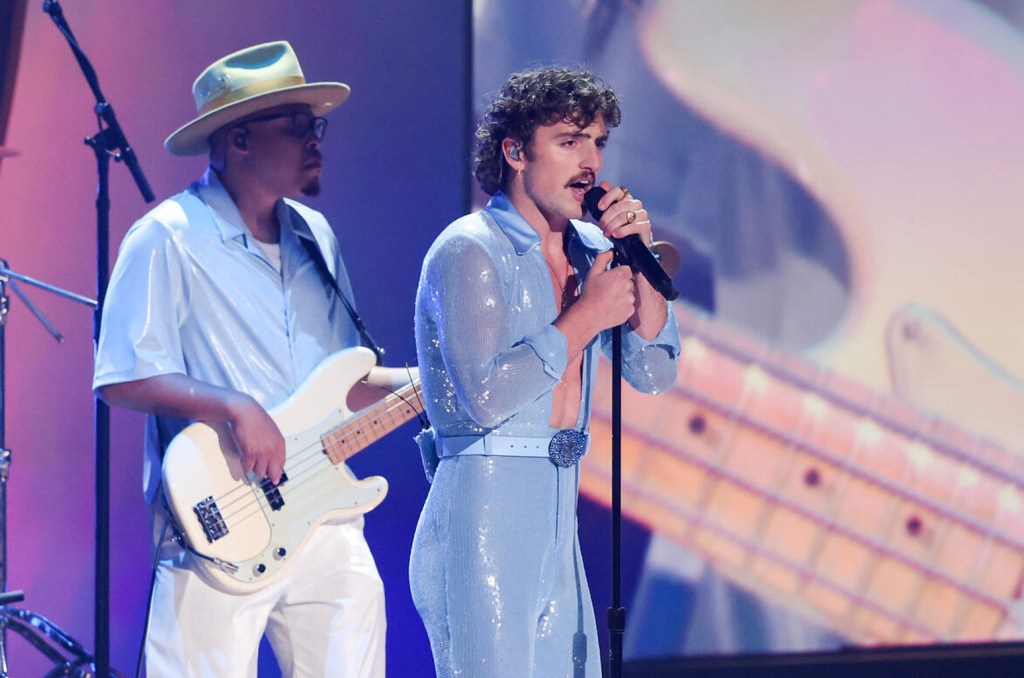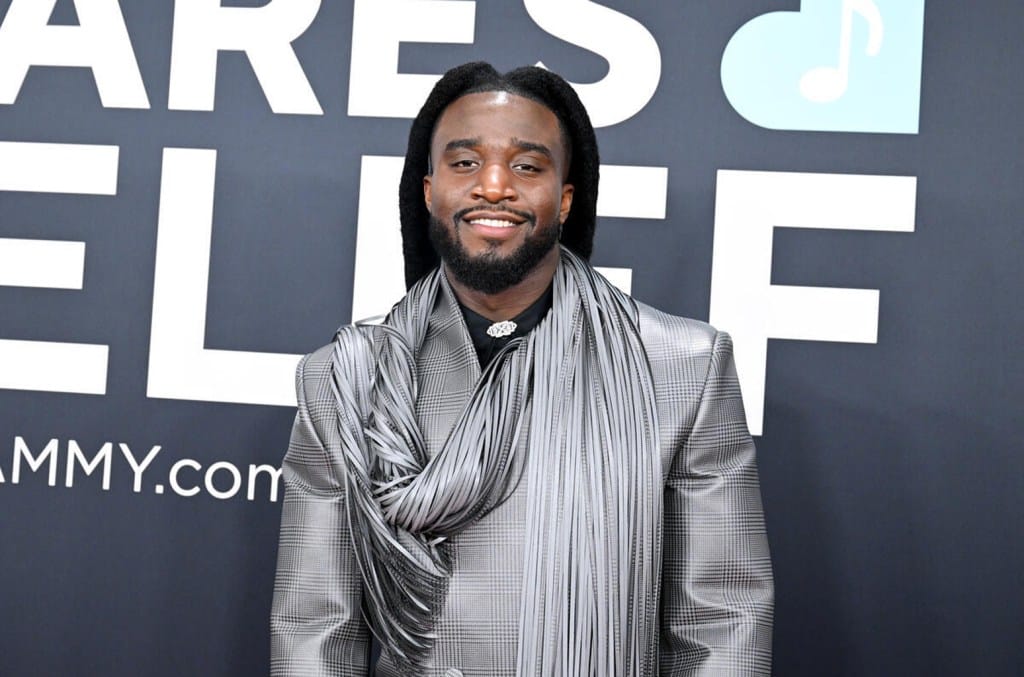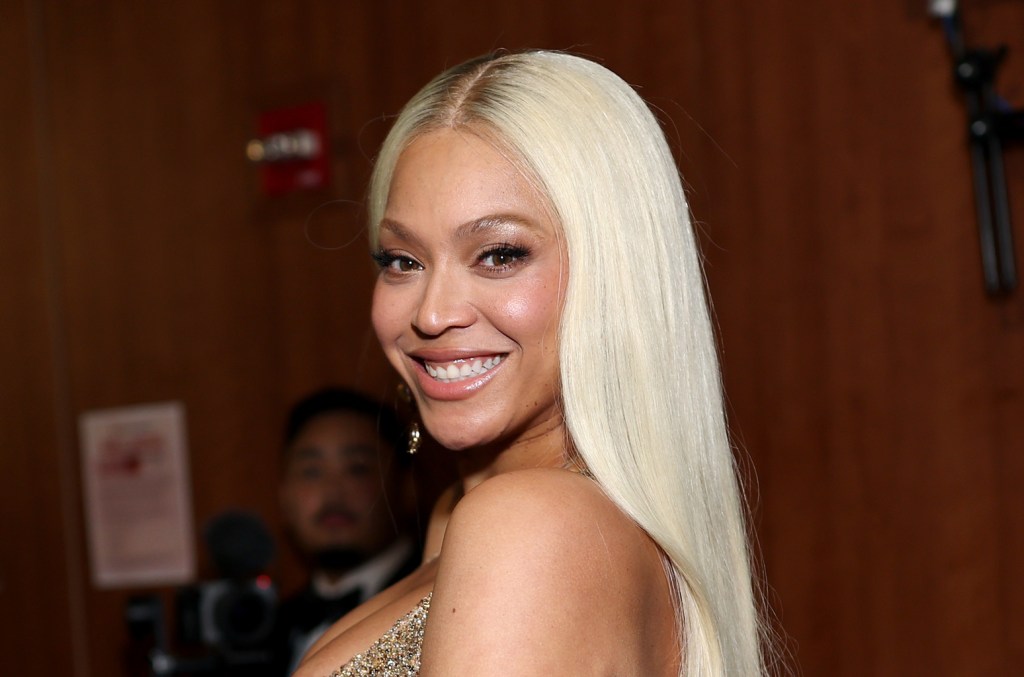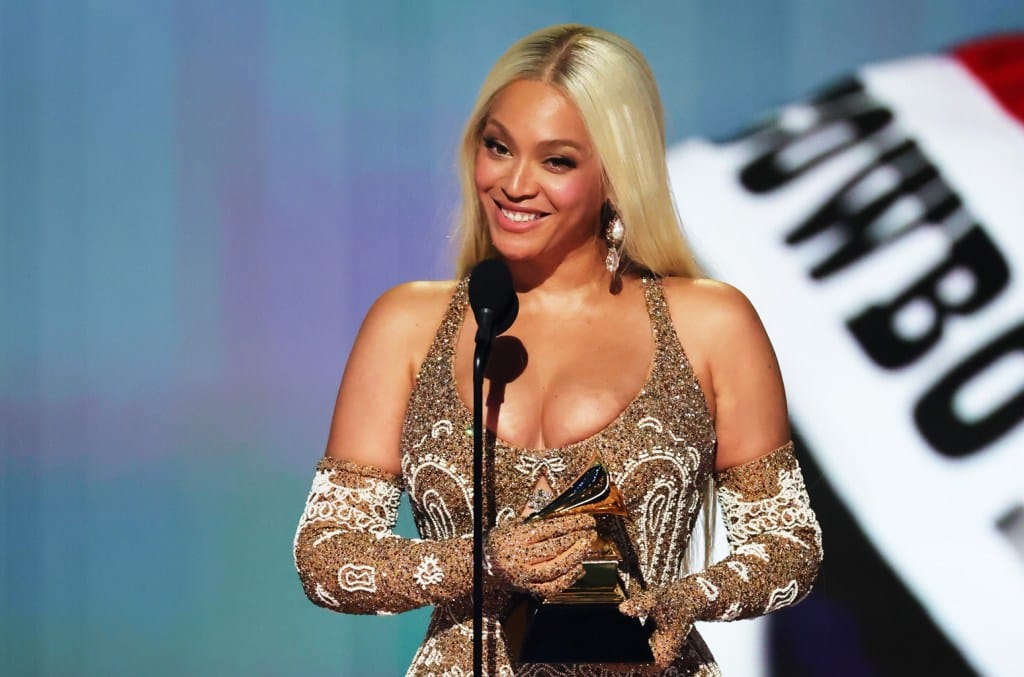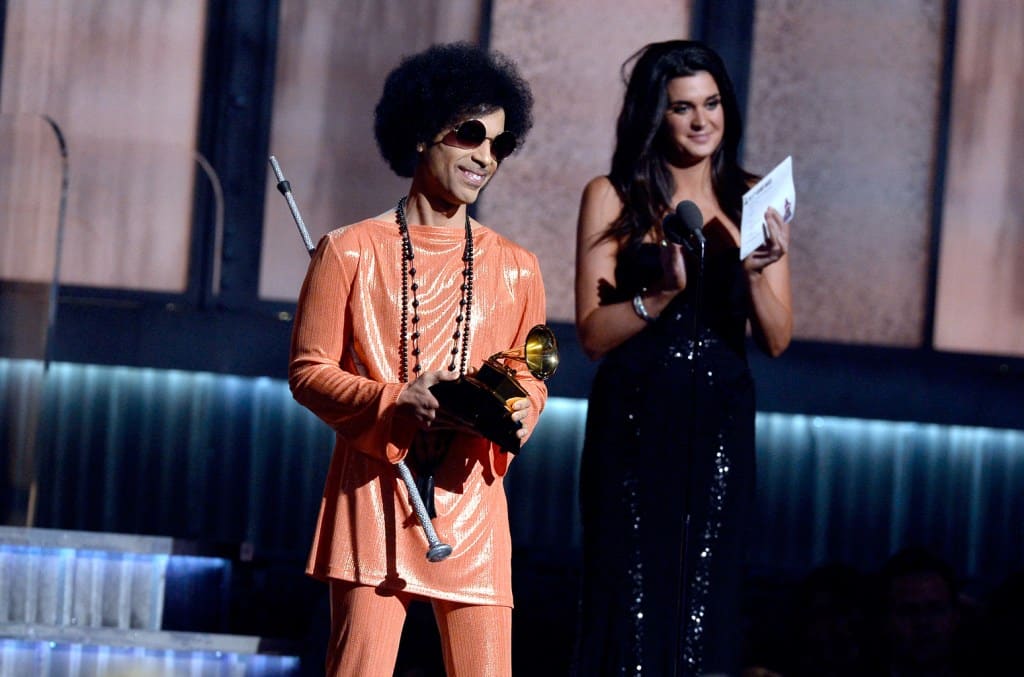grammy awards
Page: 3
Miley Cyrus won her third career Grammy at the awards ceremony on Sunday night (Feb. 2), and the superstar took to Instagram to celebrate. “Last night at the @recordingacademy,” she wrote alongside a series of photos wearing custom black Alaïa dresses. “Having your name called is an honor that deserves to be celebrated. Just remember […]

Finneas wants to spread the love following the 67th annual Grammy Awards. The superstar producer and his sister, Billie Eilish, were nominated for multiple Grammys, including album of the year for Hit Me Hard and Soft and song of the year and record of the year for “Birds of a Feather.” While the sibling duo […]
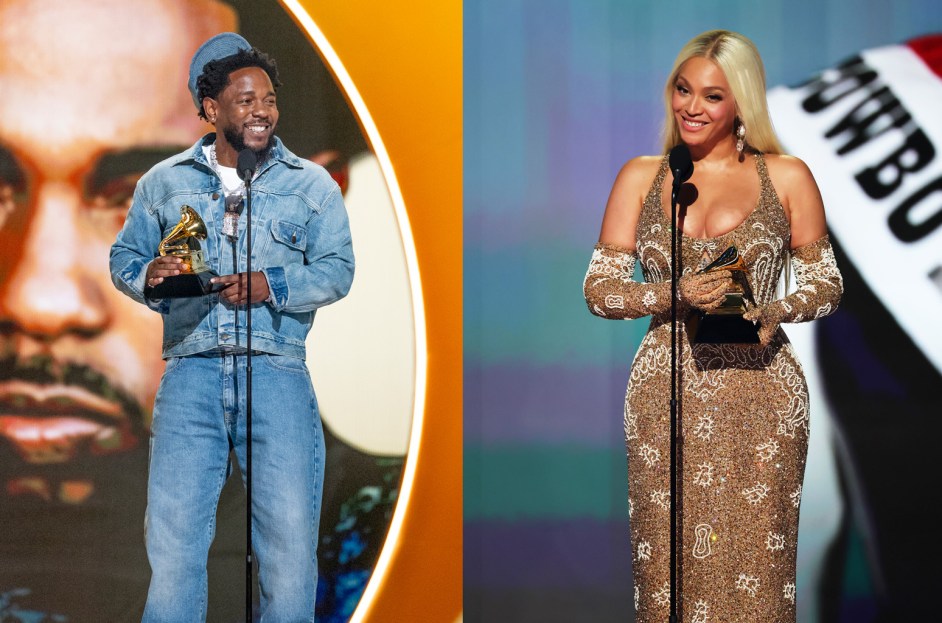
At Sunday night’s ceremony, the top prizes were won by Beyoncé and Kendrick Lamar.
If you caught Benson Boone performing as part of the best new artist medley at Sunday night’s (Feb. 2) 2025 Grammy Awards you likely saw the singer pull off one of his signature flip-off-the-grand-piano moves. It was impressive, even more so because he busted out another forward flip later in the high-energy run of his […]
Though he went home empty-handed, Shaboozey had a heckuva night at the 2025 Grammy Awards on Sunday (Feb. 2), where he performed a medley of his hits alongside the other best new artist nominees. When Billboard caught up with the “Good News” singer backstage after the ceremony — where he was up for five awards […]

Amy Allen made history at the 67th annual Grammy Awards on Sunday (Feb. 2), becoming the first woman to win for songwriter of the year, non-classical. The category is still fairly new: This was just the third year it was presented. Tobias Jesso Jr. was the inaugural winner in 2023, for writing songs by such artists […]
Beyoncé notched a number of firsts on Sunday night (Feb. 2) at the 2025 Grammy Awards. Not only did she become the first Black woman to take home the album of the year award as the lead artist this century when Cowboy Carter took the top prize, but she also finally scored her long-sought first win in the AOTY category after four previous nominations and losses.
Asked what the award means to her by ET after the show, Beyoncé said, “It’s very surreal and it’s been 25 years of working really had and trying me best to keep growing and keep opening up doors… so I’m just very honored.” In accepting the award, Bey shouted out the members of the Los Angeles Fire Department who presented it to her, thanking them for keeping Angelenos safe during the recent deadly wildfires that were acknowledged frequently during Sunday’s fundraising broadcast.
Trending on Billboard
“I’d like to thank and acknowledge and praise all of the firefighters for keeping us safe,” she said during the show. “I just feel very full and very honored. It’s been many, many years.”
A reporter for the Recording Academy also caught up with the singer backstage and got a similarly jubilant answer. “I feel overwhelmed, so full, thank you so much. This is a beautiful night,” she said, adding with some sass and a wrist roll, “the Beyhive is buzzin‘!”
In her chat with ET, Bey also said she was glad that her and Jay-Z’s eldest daughter, Blue Ivy, was on hand to see her mom triumph and join her on stage for the big moment. “Taller than me, and I don’t like it at all,” the singer joked about the 13-year-old, noting that their youngest daughter, four-year-old Rumi — who is also on Cowboy Carter — was “at home watching and I forgot to thank her so I get to thank her now: Thank you, Rumi.”
Beyoncé also took time to acknowledge that the Carter album was a means to introduce many more people to the deep history of Black country artists while showcasing such contemporary players as Rhiannon Giddens, whose hot banjo licks on the “Texas Hold ‘Em” single likely put a lot more eyes on her long career in country/bluegrass music.
“The banjo has a deep history and I just feel honored to reintroduce some of that history that I think has been lost and very, very honored that I got the response and the open heart and that people welcomed the album,” Beyoncé said, appearing to get a little teary-eyed when the interviewer mentioned how touched Giddens said she was in an chat last year about her prominent spot on the album.
“The love I got from the country community tonight really made me feel so seen and I’m very grateful,” Beyoncé said. “Hopefully they continue to open up the world for people that just love and respect the genre, no matter where they come from, everybody should be invited.”
In addition to AOTY, the 11-times nominated Cowboy Carter also won best country album, making Bey the first Black woman to ever take home the prize; she also won best country duo/group performance thanks to her Miley Cyrus team-up on “II Most Wanted.”
Watch Beyoncé talk AOTY Grammy win below.
Many of the awards at the 67th annual Grammys went exactly as predicted. Of the six General Field categories I handicapped on Jan. 6 (the Monday after final voting closed), five went as I foresaw. But there were still plenty of snubs and surprises across the (gulp) 94 categories that were presented on Sunday (Feb. […]
Beyoncé finally won the Grammy for album of the year at the 67th annual Grammy Awards on Sunday (Feb. 2) for her country project Cowboy Carter. The win followed four previous losses in the category, for I Am…Sasha Fierce, Beyoncé, Lemonade and Renaissance.
Beyoncé is just the fourth Black woman to win album of the year as a lead artist, following Natalie Cole, Whitney Houston and Lauryn Hill. (Two of these women won for stylistic departures – Cole for her warm embrace of the traditional pop songs made famous by her father, Nat “King” Cole, and Bey for an album which sought to bring attention to Black artists’ overlooked role in country music history. Beyoncé won a total of three awards on the night, extending her record as the artist with the most wins ever to 35.
Cowboy Carter is the first country album to win album of the year since Kacey Musgraves’ Golden Hour six years ago. Cowboy Carter didn’t receive a single nomination at the Country Music Association Awards in November. The same thing happened with The Chicks’ album Taking the Long Road, which won album of the year at the Grammys in 2007 despite being blanked at the CMA Awards. It is believed to have swept the Grammys because voters were making a point about freedom of speech, amid the severe backlash the group experienced following Natalie Maines’ critical comments about President George W. Bush. Note: The Chicks were nominated for vocal group of the year at the CMAs the following year.
Trending on Billboard
Lamar was the year’s top Grammy winner, with five wins, followed by Sierra Ferrell, with four; Beyoncé, Charli XCX and St. Vincent, with three each; and Jon Batiste, Sabrina Carpenter, Gustavo Dudamel, Samara Joy and CeCe Winans, with two each.
Kendrick Lamar’s “Not Like Us” won record of the year, becoming just the second rap smash to win in the category. It follows Childish Gambino’s “This Is America” in 2019. This is the second time in four years that Black lead or co-lead artists have won both album and record of the year in the same year. On the 2022 telecast, Jon Batiste won album of the year for We Are. Silk Sonic, with Anderson .Paak alongside Bruno Mars, won record of the year for “Leave the Door Open.”
Chappell Roan won best new artist. This is the eighth consecutive year that a female solo artist has won best new artist. That constitutes the longest winning streak by women artists in the history of the category, topping the seven-year winning streak that extended from 1997 to 2003.
Amy Allen became the first woman to win the award for songwriter of the year, non-classical. The first two winners in the category were Tobias Jesso Jr. and Theron Thomas.
Daniel Nigro won producer of the year, non-classical. He was first nominated in the category last year, when the award went to Jack Antonoff (who was not nominated this year).
Elaine Martone won producer of the year, classical for the third time. She’s the third woman to win the award, joining Judith Sherman (seven wins) and Joanna Nickrenz (two wins). Note that women producers have won 12 times in this category, compared to zero times in the producer of the year, non-classical category – which had a five-year head-start on the classical producer award.
Sabrina Carpenter won best pop vocal album for Short n’ Sweet. She beat three past winners in the category – Taylor Swift (who has won it twice), Ariana Grande and Billie Eilish, as well as the red-hot Chappell Roan. That’s what you call a stacked category.
Lady Gaga and Bruno Mars’ “Die With a Smile” won best pop duo/group performance. It’s Gaga’s record third win in the category. She previously won for “Shallow” with Bradley Cooper in 2019 and “Rain on Me” with Ariana Grande in 2021. That was Mars’ 12th consecutive Grammy win without a loss. Alas, Mars’ winning streak came to an end on the live telecast when “Die With a Smile” lost song of the year. Still, 12 wins in a row without a loss ain’t bad.
The Beatles won best rock performance for “Now and Then.” This is the group’s first win in a rock category. (The Grammys didn’t have categories dedicated specifically to rock until the 1980 ceremony.) Most would call “A Hard Day’s Night” a rock performance, but it won in the genre-less category of best performance by a vocal group. The Grammys had rock categories when “Free as a Bird” won a Grammy in 1997, but it won instead for best pop performance by a vocal group.
The Rolling Stones’ Hackney Diamonds won best rock album. The Stones were the first winners in the category when it was first presented in 1985, for their album Voodoo Lounge. This is the first time that The Beatles and The Stones, the two top rock groups of the 1960s, have won Grammys in the same year.
St. Vincent’s All Born Screaming won best alternative music album. It’s her third win in the category, which puts her in a tie with Beck, Radiohead and The White Stripes for the most wins in the category’s history. She also won best alternative music performance for “Flea” and best rock song for “Broken Man,” two tracks from the album.
Doechii’s mixtape Alligator Bites Never Heal won best rap album. Doechii is just the third woman to win in this category, following Lauryn Hill (as part of Fugees, for their second album, The Score) and Cardi B, for her debut album, Invasion of Privacy. In a fitting touch, Cardi B presented Doechii with the award. Doechii beat Eminem’s The Death of Slim Shady (Coup De Grace). Em has won six times in this category, and in fact had only lost once before – when Ye’s Late Registration beat Encore in 2006.
Norah Jones’ Visions won best traditional pop vocal album, 22 years after she won best pop vocal album for Come Away With Me. Jones is the fifth artist to win in both of these categories, following Joni Mitchell, Lady Gaga, James Taylor and Paul McCartney (counting an early pop album award with The Beatles).
Chris Stapleton won best country solo performance for a record-extending fifth time. That’s more than double the tally of the next two winners combined. Carrie Underwood and Willie Nelson have each won twice since this gender-neutral category was introduced in 2012.
Beyoncé featuring Miley Cyrus won best country duo/group performance for “II Most Wanted.” It’s the first time that two artists from outside the country world have won for a collaboration in that category. Pentatonix and Justin Bieber have each won in the category, but for collaborations with core country artists – Dolly Parton and Dan + Shay, respectively.
Kendrick Lamar became the first artist to win best music video three times. He won this year for “Not Like Us,” having previously won as a featured artist on Taylor Swift’s “Bad Blood” and for his own video “Humble.” Lamar was among the video directors on both “Humble.” and “Not Like Us.”
Lamar also won a record-extending seventh time for best rap performance. And he won best rap song for the fifth time, a tally topped only by Ye (with seven wins).
Cowboy Carter also won best country album. Beyoncé is the first Black artist to win in that category.
The late Chick Corea won best jazz instrumental album for Remembrance, a collab with Béla Fleck. It’s Corea’s 28th Grammy, which puts him in a tie with the late Quincy Jones for third place on the all-time Grammy leaderboard. They are topped by just two artists – a total topped by Beyoncé (35) and Sir Georg Solti (31).
Jay-Z won his 25th Grammy for his work as a songwriter on Cowboy Carter. This allows him to stand alone as the rap artist with the most Grammys – 25. He was formerly tied for that distinction with Ye.
Sean Ono Lennon won a Grammy for best boxed or special limited edition package for a reissue of his father John Lennon’s 1973 album Mind Games. Both of the younger Lennon’s parents are multiple Grammy winners. John Lennon won seven Grammys. Yoko Ono has won two. They shared the album of the year award in 1982 for their collaborative album, Double Fantasy.
Jimmy Carter’s Last Sunday in Plains: A Centennial Celebration won best audio book, narration and storytelling recording. It’s the late president’s fourth Grammy win. Carter has won more Grammys than any other U.S. president. Bill Clinton and Barack Obama are runners-up with two wins each. Carter has won all four of his Grammys in this category, which is more than anyone else in the category’s history. Maya Angelou is second with three wins. Carter died at age 100 in December.
Hell’s Kitchen won best musical theater album. Alicia Keys won as one of the album’s producers. It’s her 17th Grammy. Keys also won the honorary Dr. Dre Global Impact Award.
Dave Chappelle’s The Dreamer won best comedy album. It’s his sixth win in the category, which puts him just one behind longtime category leader Bill Cosby. Chappelle pulls ahead of George Carlin and Richard Pryor, with five wins each.
Hans Zimmer’s Dune: Part Two won best score soundtrack for visual media (includes film and television). This makes up for the fact that the score wasn’t allowed to compete in this year’s Oscar voting process because it was judged to have leaned too heavily on Zimmer’s score for the first Dune. This is Zimmer’s third win in this Grammy category, following Crimson Tide and The Dark Knight, a collab with James Newton Howard.
The Taj Mahal Sextet won best traditional blues album for Swingin’ Live at the Church in Tulsa. The win came less than 24 hours after Taj Mahal received a lifetime achievement award from the Recording Academy at their annual Special Merit Awards.
The deluxe edition of Bob Marley: One Love – Music Inspired by the Film won best reggae album. Among the albums the soundtrack beat this year: Evolution, the latest album by Marley’s band, The Wailers. Marley never won a Grammy in competition – the Grammys didn’t introduce a reggae album category until 1984, three years after Marley’s death. The Academy awarded Marley a lifetime achievement award in 2001.
Gillian Welch and David Rawlings’ Woodland won best folk album – the pair’s second win in the category. They previously won in 2021 for All the Good Times. They are the second two-time winner in the category, following Chris Thile.
We all know that Prince was a musical genius, but at the Recording Academy’s Special Merit Awards on Saturday (Feb. 1), Jimmy Jam, formerly of The Time, told of other keys to Prince’s success – he was willing to outwork anybody and he could be something of a taskmaster. “He had the best work ethic of anybody I ever met,” Jam said flatly.
Jam recalled workshopping The Time’s 1982 hit “777-9311” (which Prince co-wrote with Morris Day). Prince kept giving Jam notes, pushing him to improve various aspects of the performance and choreography. Some might have chafed at all the notes, but Jam took Prince’s tutoring the right way. “What that lesson taught me was that he saw me as better than I saw myself.” Jam added that he has tried to pass that on. “I want to enlighten other people to their greatness.”
Prince was one of seven artists to receive lifetime achievement awards at this year’s ceremony, which was held at its usual home, the Wilshire Ebell Theater in Los Angeles. Lifetime achievement awards also went to The Clash, Frankie Valli, Frankie Beverly, Dr. Bobby Jones, Taj Mahal and Roxanne Shante. The trustees award recipients were Erroll Garner, Glyn Johns and Tania León. Dr. Leo Beranek was the Technical Grammy Award honoree.
Trending on Billboard
Several people spoke in the Prince tribute – Prince’s niece Rihanna Nelson (accompanied by her daughter and her twin sons, who wore tuxes with tennis shoes); Jam and Jerome Benton of The Time; Andre Cymone and Bobby Z. of Prince’s backing bands; Prince’s longtime manager/attorney L. Londell McMillan, and Charles F. Spicer Jr., a partner in managing Prince’s legacy.
“He was an advocate for artist rights,” McMillan said. “He didn’t put ‘Slave’ on his face just for fun. He wanted to take a stand.”
Bobby Z. said he met Prince when he was 19. “He was one of the most gifted human beings that ever lived; the greatest entertainer that ever lived,” a line that received applause from the audience.
Several awards were presented posthumously. R&B singer Beverly died in September; Prince and Dr. Beranek both died in 2016; Joe Strummer of The Clash died in 2002; and Garner, the composer of the pop standard “Misty,” died in 1977. The Recording Academy has presented trustees awards since 1967 (classical conductor George Solti and his producer John Culshaw were the first recipients). It’s remarkable that it took the academy 48 years to get around to Garner.
Most of the special merit award recipients every year are advanced in age. This year, four are in their 80s. Valli is 90.
Producer/engineer Glyn Johns, 82, joked about that in his acceptance speech. “Having been notified of this award in November, my main objective has to remain alive until today. Well, I made it!,” he said.
Valli made note of how long it took the Recording Academy to get around to him. Valli has never won a Grammy, on his own or in the Four Seasons, which landed their first three No. 1 hits on the Billboard Hot 100 in 1962-63. “This has been an incredible evening,” he said. “I don’t know what took so long, but that’s the way it goes.”
Chuck D of Public Enemy (which received a lifetime achievement award in 2020) accepted for The Clash. The rapper marveled at the breadth of talent being honored on the night, singling out jazz pianist Error Garner, rock producer/engineer Glyn Johns and rapper Roxanne Shante. He read an acceptance speech from the surviving members of The Clash, which concluded with their thanks to Chuck D for accepting the award for them. “As you heard our voice, we also heard yours,” a nice example of cross-genre respect.
Shante’s 1985 R&B hit “Roxanne’s Revenge,” an answer record to UTFO’s “Roxanne, Roxanne,” was described as the first rap diss track. Shante is 55, making her the youngest of this year’s honorees. Shante said when she learned of her award, she finally felt she had made it. She said when an artist enters the business, they want three things – a record that gets on the Billboard charts, to get paid for it, and to win a Grammy. Now, she said, she has realized all three goals. Shante also paid her respects to Biz Markie, the “Just a Friend” hitmaker who died in 2021 at age 57. “I lost my hip-hop brother,” she said.
Taj Mahal was accompanied by two of his daughters as he accepted his award. He suggested that his path in music may have been pre-ordained. His parents met at a Chick Webb/Ella Fitzgerald concert at the Savoy Ballroom in Harlem in 1937.
Most of the awards were accepted by the recipients, or family members, in the case of the recipients who have died. The award to Frankie Beverly was accepted by his son, Anthony Beverly, and by Ronald “Roame” Lowry, a longtime member of Beverly’s group, Maze. Lowry said that the group’s classic “Before I Let Go” is “the most danceable song about breaking up.”
The award to acoustics expert Dr. Leo Beranek, the Technical Grammy Award honoree, was accepted by his son, Tom Haynes. “My dad accomplished many things, working until he was 87 on concert halls in Japan,” he said. Beranek died in 2016 at age 102.
The academy also presented its music educator of the year award to Adrian L. Maclin of Cordova High School outside Memphis, Tenn., who said when he was a boy his dream was to become an artist and win a Grammy. His path segued into music education and now he has won a Grammy by turning other kids onto music.
The final presentation of the night was the Harry Belafonte Best Song for Social Change Award. This was the third year the award has been presented; the first since it was named in honor of the late singer, actor and activist, whose daughters Gina and Shari Belafonte were present. The award originated as a Special Merit Award but was recategorized as a CEO’s Merit Award.
Iman Jordan, who won for his song “Deliver,” noted that “Nina Simone said that art should reflect the times – and I wasn’t hearing much of that.” He co-wrote the winning song with his father, Roy Gartrell, along with Ariel Loh and Tam Jones.
Many have said that the Special Merit Award ceremony is warmer and more congenial than the following night’s Grammys. But one thing is missing. There are video packages before every presentation, but not a note of live music. If nothing else, the music educator award could include a performance by some of his/her prized pupils, and the winner of the Song for Social Change award could be performed.
Several of this year’s recipients had already received major honors. Prince was inducted into the Rock & Roll Hall of Fame in 2004, received a lifetime achievement award at the BET Awards in 2010, and was honored by the Songwriters Hall of Fame in July 2024 (he had been voted in while he was alive, but scheduling the presentation proved difficult).
Valli was voted into the Rock & Roll Hall of Fame (as a member of the Four Seasons) in 1990, followed by The Clash in 2003 and producer Glyn Johns in 2012. Maze featuring Frankie Beverly received a lifetime achievement award at the BET Awards in 2012. León received a Kennedy Center Honor in 2022.
Lifetime Achievement Awards are presented to performers who have made creative contributions of outstanding artistic significance to the field of recording.
Trustees Awards are presented to individuals who have made significant contributions, other than performance, to the field of recording.
Technical Grammy Awards are presented to individuals, companies, organizations or institutions who have made contributions of outstanding technical significance to the recording field.

 State Champ Radio
State Champ Radio 
